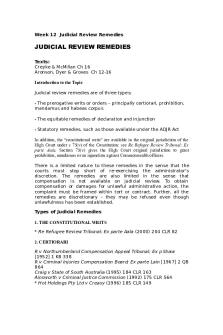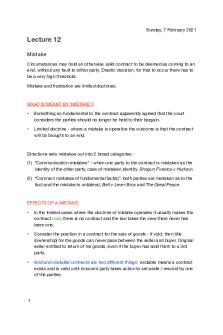3 - Lecture notes 1-2 unit PDF

| Title | 3 - Lecture notes 1-2 unit |
|---|---|
| Course | Moral Philosophy |
| Institution | Flinders University |
| Pages | 2 |
| File Size | 50.5 KB |
| File Type | |
| Total Downloads | 10 |
| Total Views | 142 |
Summary
PHIL...
Description
notion of patients imparting information to health professionals who promise, implicitly or explicitly, not to disclose that information to others is known as _____. Confidentiality Kantian ethics implies an unambiguous duty to truth-telling and confidentiality. True Data from surveys suggest that most patients prefer to be told the truth about their diagnosis. True In the Hippocratic Oath, the physician's respect for confidentiality is clearly expressed. Many skeptics of full disclosure have argued that physicians have no duty to tell patients the truth because... patients are incapable of understanding the truth. Using Kantian ethical reasoning, one would consider the consequences of breaching confidentiality in order to carry out one's duty to warn. False For an act-utilitarian, the moraltiy of truth-telling and confidentiality must be judged... case by case The case of Carlos R. was mostly about... medical confidentiality versus a duty to warn. The law recognizes that the duty to respect confidentiality has exceptions. True The authority of persons to control who may possess and use information about themselves is considered... a right to privacy. The physician's duties of confidentiality and preventing harm are... sometimes in conflict in HIV cases. Suppose a physician is trying to decide whether to report a patient's HIV-positive condition to a family caregiver of that patient by weighing the possible harms and benefits of telling versus the possible harms and benefits of not telling. Which theory best describes the physician's moral reasoning? Act-utilitarianism Advocates of full disclosure insist that informed patients are... better patients. All physicians agree that the obligation to respect confidentiality is absolute. False Disclosure of confidential medical information could expose some patients to discrimination from insurance companies and employers. True Some state laws require physicians to reveal information about a patient in which of the following conditions? A & B only Some proponents of full disclosure argue that... conveying the "whole truth and nothing but the truth" is unnecessary. Most cancer patients want to know the details of their disease, whether the news is good or bad. True The Hippocratic Oath insists on a strong duty of truth-telling. False Complete confidentiality in modern health care is entirely feasible. False
The main argument in favor of truth-telling rests on the physician's duty of beneficence. False Justices in the Tarasoff case directed their primary attention to the first cause of action, namely, whether or not it mattered that Poddar did not specifically name Tatiana as the girl he was going to murder. False The case of Tarasoff v. Regents of the University of California concerned a conflict between... A duty of confidentiality and a duty to warn. The defendants in the Tarasoff case argued that even though they realized they owed a duty of care to Tatiana and her parents, they were not required to report Poddar's threat because he was a voluntary outpatient. False A psychotherapist's negligence in controlling the conduct of a patient who threatens to kill a third party carries the same liability as... a medical doctor's failure to tell a patient not to drive when taking medications that make driving dangerous. In the Tarasoff case, the "third party" is Tatiana Tarasoff. In the Tarasoff case, the Amicus brief (which argued that therapists cannot accurate predict patient violence) was filed by... The American Psychiatirc Association in favor of the defendants. The Justices in the Tarasoff case used which of these things as support for their argument? All of the above. Under common law, an ordinary person like you or me has no duty to control the conduct of another, even if we foresee that such conduct will harm a third party. True In the Tarasoff case, the justices determined that although Poddar's therapist had a special relationship with him, that did NOT entail that the therapist had any affirmative duties for the benefit of third persons. False Megan's Law is the federal law passed in 1996 that authorizes local law enforcement agencies to notify the public about convicted sex offenders living, working, or visiting in their communities. How might the reasoning used in deciding to pass this law be similar to the reasoning used by the judges in the Tarasoff case? The sex offender's right to privacy, like Poddar's, is trumped by (not as important as) the safety of a third party. In the Tarasoff case, Amicus contended that even when a therapist predicts that a patient is dangerous, the therapist has no responsibility to protect a third party. True...
Similar Free PDFs

Unit 3 - Lecture notes 9-12
- 5 Pages

Unit-3-Notes - Lecture notes 3
- 12 Pages

UNIT 3(VKT) lecture notes
- 15 Pages

Unit-1 - Lecture notes 3
- 39 Pages

12 - Lecture notes 12
- 3 Pages

Lecture notes, lecture 12
- 9 Pages

Lecture notes, lecture 12
- 7 Pages

Unit 12 notes
- 8 Pages

Chapter 12 - Lecture notes 12
- 4 Pages

Lab 12 - Lecture notes 12
- 5 Pages

LEC 12 - Lecture notes 12
- 3 Pages

(12) Mistake - Lecture notes 12
- 8 Pages

Chapter 12 - Lecture notes 12
- 9 Pages
Popular Institutions
- Tinajero National High School - Annex
- Politeknik Caltex Riau
- Yokohama City University
- SGT University
- University of Al-Qadisiyah
- Divine Word College of Vigan
- Techniek College Rotterdam
- Universidade de Santiago
- Universiti Teknologi MARA Cawangan Johor Kampus Pasir Gudang
- Poltekkes Kemenkes Yogyakarta
- Baguio City National High School
- Colegio san marcos
- preparatoria uno
- Centro de Bachillerato Tecnológico Industrial y de Servicios No. 107
- Dalian Maritime University
- Quang Trung Secondary School
- Colegio Tecnológico en Informática
- Corporación Regional de Educación Superior
- Grupo CEDVA
- Dar Al Uloom University
- Centro de Estudios Preuniversitarios de la Universidad Nacional de Ingeniería
- 上智大学
- Aakash International School, Nuna Majara
- San Felipe Neri Catholic School
- Kang Chiao International School - New Taipei City
- Misamis Occidental National High School
- Institución Educativa Escuela Normal Juan Ladrilleros
- Kolehiyo ng Pantukan
- Batanes State College
- Instituto Continental
- Sekolah Menengah Kejuruan Kesehatan Kaltara (Tarakan)
- Colegio de La Inmaculada Concepcion - Cebu


